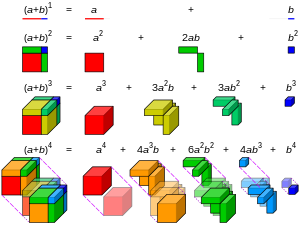
Back معامل ذات الحدين Arabic Binomial əmsallar Azerbaijani Биномен коефициент Bulgarian দ্বিপদী সহগ Bengali/Bangla Coeficient binomial Catalan ھاوکۆلکەی دوو ڕادەیی CKB Kombinační číslo Czech Бином коэффициенчĕсем CV Binomialkoefficient Danish Binomialkoeffizient German


In mathematics, the binomial coefficients are the positive integers that occur as coefficients in the binomial theorem. Commonly, a binomial coefficient is indexed by a pair of integers n ≥ k ≥ 0 and is written It is the coefficient of the xk term in the polynomial expansion of the binomial power (1 + x)n; this coefficient can be computed by the multiplicative formula
which using factorial notation can be compactly expressed as
For example, the fourth power of 1 + x is
and the binomial coefficient is the coefficient of the x2 term.
Arranging the numbers in successive rows for n = 0, 1, 2, ... gives a triangular array called Pascal's triangle, satisfying the recurrence relation
The binomial coefficients occur in many areas of mathematics, and especially in combinatorics. In combinatorics the symbol is usually read as "n choose k" because there are ways to choose an (unordered) subset of k elements from a fixed set of n elements. For example, there are ways to choose 2 elements from {1, 2, 3, 4}, namely {1, 2}, {1, 3}, {1, 4}, {2, 3}, {2, 4} and {3, 4}.
The first form of the binomial coefficients can be generalized to for any complex number z and integer k ≥ 0, and many of their properties continue to hold in this more general form.









